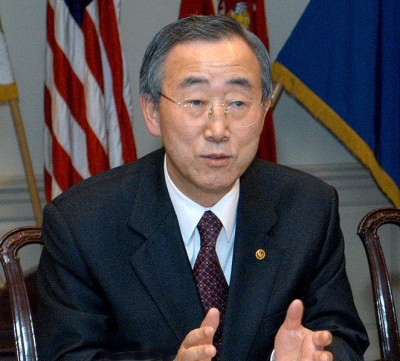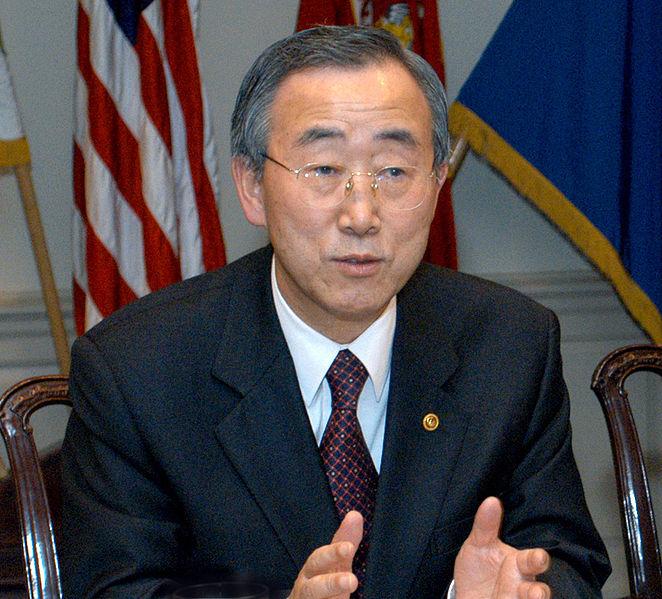 No matter the administration in Washington, it’s always a good time to attack the United Nations. The familiar trope is “waste, mismanagement, and corruption.” The Oil for Food investigation during the Bush years, for instance, generated immense amounts of smoke but in the end very little fire. Now we learn that U.S. auditors have “found that the Pentagon can’t account for more than 95 percent of $9.1 billion in Iraq reconstruction money.” The media that actually mentioned the story failed to acknowledge that the money was in fact the surplus from the UN Oil for Food Fund.
No matter the administration in Washington, it’s always a good time to attack the United Nations. The familiar trope is “waste, mismanagement, and corruption.” The Oil for Food investigation during the Bush years, for instance, generated immense amounts of smoke but in the end very little fire. Now we learn that U.S. auditors have “found that the Pentagon can’t account for more than 95 percent of $9.1 billion in Iraq reconstruction money.” The media that actually mentioned the story failed to acknowledge that the money was in fact the surplus from the UN Oil for Food Fund.
Of course there is corruption and waste at the UN. But as this report from Iraq demonstrates yet again, the scale is minimal compared to the corruption and waste of the U.S. government. One reason for the disparity is that the world organization has so little money. In the early 1990s when the right wing began its attacks on UN corruption, the U.S. attorney in New York estimated that the mafia was making more out of waste management contracts from the city than the UN’s entire budget.
Although this media trope has become almost reflexive, it does serve a purpose. It keeps the organization on the defensive and is thus more pliable. The latest attack comes from Inga-Britt Ahlenius, the Swede retiring from the top job at the UN’s Office of Internal Oversight Services (OIOS). Her rambling, chiding, and scolding diatribe directed at Ban Ki Moon was recently leaked to the press. It immediately joined Foreign Policy’s neo-con lament that Ban had failed to live up to John Bolton’s expectations and a frustrated UN-job-seeking Norwegian diplomat’s bilious critique of the UN secretary general.
Sometimes Valid, Mostly Perverse
The Ahlenius report contains some valid criticisms of Ban’s administrative capabilities, which others have made with more balance and objectivity. But its bizarre tone and rambling nature probably raised alarms for those who read it. Indeed, if she had kept it shorter, the usual suspects in the media would have made even more of her criticisms.
However, the drift of her long and discursive report is perverse. Ban, as secretary general, refused to allow her to appoint a former deputy U.S. attorney as her deputy in the investigations unit. She had persisted in coming up with a shortlist of one white American male when Ban and the UN insisted that there had to be a woman on a shortlist of at least three. While accusing Ban of weak management, in fact she complains when he exercises management.
With reverberations of wounded amour propre, she accuses him of ignoring his senior management team of undersecretary generals in favor of his own appointees, and consistently downgrades his position by referring to him as the “chief administrative officer.” In fact, in a pattern accepted by all of her exemplar secretary generals, including Dag Hammarskjöld, the senior officials are foisted upon the UN by the Permanent Five and owe no loyalty to the organization, let alone to the incumbent secretary general. As it happens, many of these appointees have shown staunch independence from their nominating governments — but by no means all of them. So, as one senior member of Kofi Annan’s kitchen cabinet asked me, “Who would you turn to for advice: people you had chosen yourself, or effective agents of foreign powers?”
The Problematic OIOS
Nor is her own organization, the OIOS, the paragon of virtue suggested by its inflated reports of its own successes. For many conscientious staff, the OIOS has been as arrogant and intrusive as it has been incompetently bureaucratic, far more concerned with nitpicking than achieving the UN’s mission.
Boutros Boutros Ghali set up the office in 1994 in response to congressional attacks on the UN, and in particular a complaint by then-U.S. ambassador to the UN Madeleine Albright that a Canadian company had bribed UN procurement staff to get contracts for air transport. The source of the allegations was a company tied to Air America, the CIA’s house airline, and perhaps not coincidentally connected as well to Senator Jon Kyl (R-AZ). To appease the United States, Boutros Ghali tried to fire, but had to be content with suspending, the eight libeled UN staff. They were all eventually cleared, reinstated, and handsomely compensated by UN tribunals, as indeed was the Canadian company. The tribunal said, coyly but tellingly, that the suspensions resulted from the UN acting “under heavy outside political pressure and of the direct accusation by a business competitor against the contractor.”
In 1999, an arbitrator dismissed reports compiled by OIOS for their risible use of hearsay and slander by self-interested rivals. In 2001 when I approached OIOS about reports of UN aircraft being used for smuggling conflict diamonds, the response of its head was to start an investigation into how I had discovered this information.
Criticisms of Ban
In the end, Ban is not to blame for the parlous state of the organization that he inherited. Ahlenius harks back to a mythical gold age under Dag Hammarskjöld. But like all other incumbents in the position, Hammarskjöld’s concrete achievements were strictly limited. For all his visionary qualities, the secretary general allowed P5 appointments of his senior officials to continue and allowed the FBI and the KGB to run riot through the organization.
In fact, Ban has demonstrated some laudable independence, including his resistance to American pressure to appoint Ahlenius’s choice for deputy. On the hustings, even as John Bolton’s candidate, he expressed support for the International Criminal Court and the “Responsibility to Protect” concept, which bespeaks a kamikaze integrity in light of Bolton’s views. Ban started out reflexively pro-Israeli. But exposure to the subject has clearly been educational, and his statements on Gaza and the flotilla stand in relatively glowing contrast to the sycophantic apologia of most current world leaders.
The criticisms of Ban come down to management style, oratory, and English. To be fair, few of his predecessors came away with A-pluses on these. Dag Hammarskjöld was elected on the assumption that he was a timeserving mediocrity. Kofi Annan indeed had a numinous personality: He invited people to trust him, which is why of course his opponents worked hard to pull him down on Oil for Food. But Annan was in fact cannily circumspect in his public statements, carefully non-provocative. He benefited from a team of articulate and provocative personalities who were encouraged to speak in public. Even then there were limits — as former Irish President and Human Rights Commissioner Mary Robinson could testify — but, in general, they collectively magnified his standing.
